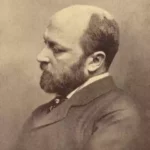 | |
Julia Bride | |
| Author | Henry James |
|---|---|
| Published |
1875
|
| Language | English |
| Nationality | American |
| Genre | American Literature, Psychological Fiction |
1875 Short Story
Julia Bride
Julia Bride is an English American Literature, Psychological Fiction short story by American writer Henry James. It was first published in 1875.
Julia Bride
by Henry James
I
She had walked with her friend to the top of the wide steps of the Museum, those that descended from the galleries of painting, and then, after the young man had left her, smiling, looking back, waving all gayly and expressively his hat and stick, had watched him, smiling too, but with a different intensity–had kept him in sight till he passed out of the great door. She might have been waiting to see if he would turn there for a last demonstration; which was exactly what he did, renewing his cordial gesture and with his look of glad devotion, the radiance of his young face, reaching her across the great space, as she felt, in undiminished truth. Yes, so she could feel, and she remained a minute even after he was gone; she gazed at the empty air as if he had filled it still, asking herself what more she wanted and what, if it didn’t signify glad devotion, his whole air could have represented.
She was at present so anxious that she could wonder if he stepped and smiled like that for mere relief at separation; yet if he desired in that degree to break the spell and escape the danger why did he keep coming back to her, and why, for that matter, had she felt safe a moment before in letting him go? She felt safe, felt almost reckless–that was the proof–so long as he was with her; but the chill came as soon as he had gone, when she took the measure, instantly, of all she yet missed. She might now have been taking it afresh, by the testimony of her charming clouded eyes and of the rigor that had already replaced her beautiful play of expression. Her radiance, for the minute, had “carried” as far as his, travelling on the light wings of her brilliant prettiness–he, on his side, not being facially handsome, but only sensitive, clean and eager. Then, with its extinction, the sustaining wings dropped and hung.
She wheeled about, however, full of a purpose; she passed back through the pictured rooms, for it pleased her, this idea of a talk with Mr. Pitman–as much, that is, as anything could please a young person so troubled. It happened indeed that when she saw him rise at sight of her from the settee where he had told her five minutes before that she would find him, it was just with her nervousness that his presence seemed, as through an odd suggestion of help, to connect itself. Nothing truly would be quite so odd for her case as aid proceeding from Mr. Pitman; unless perhaps the oddity would be even greater for himself–the oddity of her having taken into her head an appeal to him.
She had had to feel alone with a vengeance–inwardly alone and miserably alarmed–to be ready to “meet,” that way, at the first sign from him, the successor to her dim father in her dim father’s lifetime, the second of her mother’s two divorced husbands. It made a queer relation for her; a relation that struck her at this moment as less edifying, less natural and graceful than it would have been even for her remarkable mother–and still in spite of this parent’s third marriage, her union with Mr. Connery, from whom she was informally separated. It was at the back of Julia’s head as she approached Mr. Pitman, or it was at least somewhere deep within her soul, that if this last of Mrs. Connery’s withdrawals from the matrimonial yoke had received the sanction of the court (Julia had always heard, from far back, so much about the “Court”) she herself, as after a fashion, in that event, a party to it, would not have had the cheek to make up–which was how she inwardly phrased what she was doing–to the long, lean, loose, slightly cadaverous gentleman who was a memory, for her, of the period from her twelfth to her seventeenth year. She had got on with him, perversely, much better than her mother had, and the bulging misfit of his duck waistcoat, with his trick of swinging his eye-glass, at the end of an extraordinarily long string, far over the scene, came back to her as positive features of the image of her remoter youth. Her present age–for her later time had seen so many things happen–gave her a perspective.
Fifty things came up as she stood there before him, some of them floating in from the past, others hovering with freshness: how she used to dodge the rotary movement made by his pince-nez while he always awkwardly, and kindly, and often funnily, talked–it had once hit her rather badly in the eye; how she used to pull down and straighten his waistcoat, making it set a little better, a thing of a sort her mother never did; how friendly and familiar she must have been with him for that, or else a forward little minx; how she felt almost capable of doing it again now, just to sound the right note, and how sure she was of the way he would take it if she did; how much nicer he had clearly been, all the while, poor dear man, than his wife and the court had made it possible for him publicly to appear; how much younger, too, he now looked, in spite of his rather melancholy, his mildly jaundiced, humorously determined sallowness and his careless assumption, everywhere, from his forehead to his exposed and relaxed blue socks, almost sky-blue, as in past days, of creases and folds and furrows that would have been perhaps tragic if they hadn’t seemed rather to show, like his whimsical black eyebrows, the vague, interrogative arch.
Of course he wasn’t wretched if he wasn’t more sure of his wretchedness than that! Julia Bride would have been sure–had she been through what she supposed _he_ had! With his thick, loose black hair, in any case, untouched by a thread of gray, and his kept gift of a certain big-boyish awkwardness–that of his taking their encounter, for instance, so amusedly, so crudely, though, as she was not unaware, so eagerly too–he could by no means have been so little his wife’s junior as it had been that lady’s habit, after the divorce, to represent him. Julia had remembered him as old, since she had so constantly thought of her mother as old; which Mrs. Connery was indeed now–for her daughter–with her dozen years of actual seniority to Mr. Pitman and her exquisite hair, the densest, the finest tangle of arranged silver tendrils that had ever enhanced the effect of a preserved complexion.
Something in the girl’s vision of her quondam stepfather as still comparatively young–with the confusion, the immense element of rectification, not to say of rank disproof, that it introduced into Mrs. Connery’s favorite picture of her own injured past–all this worked, even at the moment, to quicken once more the clearness and harshness of judgment, the retrospective disgust, as she might have called it, that had of late grown up in her, the sense of all the folly and vanity and vulgarity, the lies, the perversities, the falsification of all life in the interest of who could say what wretched frivolity, what preposterous policy; amid which she had been condemned so ignorantly, so pitifully to sit, to walk, to grope, to flounder, from the very dawn of her consciousness. Didn’t poor Mr. Pitman just touch the sensitive nerve of it when, taking her in with his facetious, cautious eyes, he spoke to her, right out, of the old, old story, the everlasting little wonder of her beauty?
“Why, you know, you’ve grown up so lovely–you’re the prettiest girl I’ve ever seen!” Of course she was the prettiest girl he had ever seen; she was the prettiest girl people much more privileged than he had ever seen; since when hadn’t she been passing for the prettiest girl any one had ever seen? She had lived in that, from far back, from year to year, from day to day and from hour to hour–she had lived for it and literally _by_ it, as who should say; but Mr. Pitman was somehow more illuminating than he knew, with the present lurid light that he cast upon old dates, old pleas, old values, and old mysteries, not to call them old abysses: it had rolled over her in a swift wave, with the very sight of him, that her mother couldn’t possibly have been right about him–as about what in the world had she ever been right?–so that in fact he was simply offered her there as one more of Mrs. Connery’s lies. She might have thought she knew them all by this time; but he represented for her, coming in just as he did, a fresh discovery, and it was this contribution of freshness that made her somehow feel she liked him. It was she herself who, for so long, with her retained impression, had been right about him; and the rectification he represented had _all_ shone out of him, ten minutes before, on his catching her eye while she moved through the room with Mr. French. She had never doubted of his probable faults–which her mother had vividly depicted as the basest of vices; since some of them, and the most obvious (not the vices, but the faults) were written on him as he stood there: notably, for instance, the exasperating “business slackness” of which Mrs. Connery had, before the tribunal, made so pathetically much. It might have been, for that matter, the very business slackness that affected Julia as presenting its friendly breast, in the form of a cool loose sociability, to her own actual tension; though it was also true for her, after they had exchanged fifty words, that he had as well his inward fever and that, if he was perhaps wondering what was so particularly the matter with her, she could make out not less that something was the matter with _him_. It had been vague, yet it had been intense, the mute reflection, “Yes, I’m going to like him, and he’s going somehow to help me!” that had directed her steps so straight to him. She was sure even then of this, that he wouldn’t put to her a query about his former wife, that he took to-day no grain of interest in Mrs. Connery; that his interest, such as it was–and he couldn’t look _quite_ like that, to Julia Bride’s expert perception, without something in the nature of a new one–would be a thousand times different.
It was as a value of _disproof_ that his worth meanwhile so rapidly grew: the good sight of him, the good sound and sense of him, such as they were, demolished at a stroke so blessedly much of the horrid inconvenience of the past that she thought of him; she clutched at him, for a _general_ saving use, an application as sanative, as redemptive as some universal healing wash, precious even to the point of perjury if perjury should be required. That was the terrible thing, that had been the inward pang with which she watched Basil French recede: perjury would have to come in somehow and somewhere–oh so quite certainly!–before the so strange, so rare young man, truly smitten though she believed him, could be made to rise to the occasion, before her measureless prize could be assured. It was present to her, it had been present a hundred times, that if there had only been some one to (as it were) “deny everything” the situation might yet be saved. She so needed some one to lie for her–ah, she so need some one to lie! Her mother’s version of everything, her mother’s version of anything, had been at the best, as they said, discounted; and she herself could but show, of course, for an interested party, however much she might claim to be none the less a decent girl–to whatever point, that is, after all that had both remotely and recently happened, presumptions of anything to be called decency could come in.
After what had recently happened–the two or three indirect but so worrying questions Mr. French had put to her–it would only be some thoroughly detached friend or witness who might effectively testify. An odd form of detachment certainly would reside, for Mr. Pitman’s evidential character, in her mother’s having so publicly and so brilliantly–though, thank the powers, all off in North Dakota!–severed their connection with him; and yet mightn’t it do _her_ some good, even if the harm it might do her mother were so little ambiguous? The more her mother had got divorced–with her dreadful cheap-and-easy second performance in that line and her present extremity of alienation from Mr. Connery, which enfolded beyond doubt the germ of a third petition on one side or the other–the more her mother had distinguished herself in the field of folly the worse for her own prospect with the Frenches, whose minds she had guessed to be accessible, and with such an effect of dissimulated suddenness, to some insidious poison.
It was very unmistakable, in other words, that the more dismissed and detached Mr. Pitman should have come to appear, the more as divorced, or at least as divorcing, his before-time wife would by the same stroke figure–so that it was here poor Julia could but lose herself. The crazy divorces only, or the half-dozen successive and still crazier engagements only–gathered fruit, bitter fruit, of her own incredibly allowed, her own insanely fostered frivolity–either of these two groups of skeletons at the banquet might singly be dealt with; but the combination, the fact of each party’s having been so mixed-up with whatever was least presentable for the other, the fact of their having so shockingly amused themselves together, made all present steering resemble the classic middle course between Scylla and Charybdis.
It was not, however, that she felt wholly a fool in having obeyed this impulse to pick up again her kind old friend. _She_ at least had never divorced him, and her horrid little filial evidence in court had been but the chatter of a parrakeet, of precocious plumage and croak, repeating words earnestly taught her, and that she could scarce even pronounce. Therefore, as far as steering went, he _must_ for the hour take a hand. She might actually have wished in fact that he shouldn’t now have seemed so tremendously struck with her; since it was an extraordinary situation for a girl, this crisis of her fortune, this positive wrong that the flagrancy, what she would have been ready to call the very vulgarity, of her good looks might do her at a moment when it was vital she should hang as straight as a picture on the wall. Had it ever yet befallen any young woman in the world to wish with secret intensity that she might have been, for her convenience, a shade less inordinately pretty? She had come to that, to this view of the bane, the primal curse, of their lavish physical outfit, which had included everything and as to which she lumped herself resentfully with her mother. The only thing was that her mother was, thank goodness, still so much prettier, still so assertively, so publicly, so trashily, so ruinously pretty. Wonderful the small grimness with which Julia Bride put off on this parent the middle-aged maximum of their case and the responsibility of their defect. It cost her so little to recognize in Mrs. Connery at forty-seven, and in spite, or perhaps indeed just by reason, of the arranged silver tendrils which were so like some rare bird’s-nest in a morning frost, a facile supremacy for the dazzling effect–it cost her so little that her view even rather exaggerated the lustre of the different maternal items. She would have put it _all_ off if possible, all off on other shoulders and on other graces and other morals than her own, the burden of physical charm that had made so easy a ground, such a native favoring air, for the aberrations which, apparently inevitable and without far consequences at the time, had yet at this juncture so much better not have been.
She could have worked it out at her leisure, to the last link of the chain, the way their prettiness had set them trap after trap, all along–had foredoomed them to awful ineptitude. When you were as pretty as that you could, by the whole idiotic consensus, be nothing _but_ pretty; and when you were nothing “but” pretty you could get into nothing but tight places, out of which you could then scramble by nothing but masses of fibs. And there was no one, all the while, who wasn’t eager to egg you on, eager to make you pay to the last cent the price of your beauty. What creature would ever for a moment help you to behave as if something that dragged in its wake a bit less of a lumbering train would, on the whole, have been better for you? The consequences of being plain were only negative–you failed of this and that; but the consequences of being as _they_ were, what were these but endless? though indeed, as far as failing went, your beauty too could let you in for enough of it. Who, at all events, would ever for a moment credit you, in the luxuriance of that beauty, with the study, on your own side, of such truths as these? Julia Bride could, at the point she had reached, positively ask herself this even while lucidly conscious of the inimitable, the triumphant and attested projection, all round her, of her exquisite image. It was only Basil French who had at last, in his doubtless dry, but all distinguished way–the way surely, as it was borne in upon her, of all the blood of all the Frenches–stepped out of the vulgar rank. It was only he who, by the trouble she discerned in him, had made her see certain things. It was only for him–and not a bit ridiculously, but just beautifully, almost sublimely–that their being “nice,” her mother and she between them, had _not_ seemed to profit by their being so furiously handsome.
This had, ever so grossly and ever so tiresomely, satisfied every one else; since every one had thrust upon them, had imposed upon them, as by a great cruel conspiracy, their silliest possibilities; fencing them in to these, and so not only shutting them out from others, but mounting guard at the fence, walking round and round outside it, to see they didn’t escape, and admiring them, talking to them, through the rails, in mere terms of chaff, terms of chucked cakes and apples–as if they had been antelopes or zebras, or even some superior sort of performing, of dancing, bear. It had been reserved for Basil French to strike her as willing to let go, so to speak, a pound or two of this fatal treasure if he might only have got in exchange for it an ounce or so more of their so much less obvious and Jess published personal history. Yes, it described him to say that, in addition to all the rest of him, and of _his_ personal history, and of his family, and of theirs, in addition to their social posture, as that of a serried phalanx, and to their notoriously enormous wealth and crushing respectability, she might have been ever so much less lovely for him if she had been only–well, a little prepared to answer questions. And it wasn’t as if quiet, cultivated, earnest, public-spirited, brought up in Germany, infinitely travelled, awfully like a high-caste Englishman, and all the other pleasant things, it wasn’t as if he didn’t love to be with her, to look at her, just as she was; for he loved it exactly as much, so far as that footing simply went, as any free and foolish youth who had ever made the last demonstration of it. It was that marriage was, for him–and for them all, the serried Frenches–a great matter, a goal to which a man of intelligence, a real shy, beautiful man of the world, didn’t hop on one foot, didn’t skip and jump, as if he were playing an urchins’ game, but toward which he proceeded with a deep and anxious, a noble and highly just deliberation.
For it was one thing to stare at a girl till she was bored with it, it was one thing to take her to the Horse Show and the Opera, and to send her flowers by the stack, and chocolates by the ton, and “great” novels, the very latest and greatest, by the dozen; but something quite other to hold open for her, with eyes attached to eyes, the gate, moving on such stiff silver hinges, of the grand square forecourt of the palace of wedlock. The state of being “engaged” represented to him the introduction to this precinct of some young woman with whom his outside parley would have had the duration, distinctly, of his own convenience. That might be cold-blooded if one chose to think so; but nothing of another sort would equal the high ceremony and dignity and decency, above all the grand gallantry and finality, of their then passing in. Poor Julia could have blushed red, before that view, with the memory of the way the forecourt, as she now imagined it, had been dishonored by her younger romps. She had tumbled over the wall with this, that, and the other raw playmate, and had played “tag” and leap-frog, as she might say, from corner to corner. That would be the “history” with which, in case of definite demand, she should be able to supply Mr. French: that she had already, again and again, any occasion offering, chattered and scuffled over ground provided, according to his idea, for walking the gravest of minuets. If that then had been all their _kind_ of history, hers and her mother’s, at least there was plenty of it: it was the superstructure raised on the other group of facts, those of the order of their having been always so perfectly pink and white, so perfectly possessed of clothes, so perfectly splendid, so perfectly idiotic. These things had been the “points” of antelope and zebra; putting Mrs. Connery for the zebra, as the more remarkably striped or spotted. Such were the _data_ Basil French’s inquiry would elicit: her own six engagements and her mother’s three nullified marriages–nine nice distinct little horrors in all. What on earth was to be done about them?
It was notable, she was afterward to recognize, that there had been nothing of the famous business slackness in the positive pounce with which Mr. Pitman put it to her that, as soon as he had made her out “for sure,” identified her there as old Julia grown-up and gallivanting with a new admirer, a smarter young fellow than ever yet, he had had the inspiration of her being exactly the good girl to help him. She certainly found him strike the hour again, with these vulgarities of tone–forms of speech that her mother had anciently described as by themselves, once he had opened the whole battery, sufficient ground for putting him away. Full, however, of the use she should have for him, she wasn’t going to mind trifles. What she really gasped at was that, so oddly, he was ahead of her at the start. “Yes, I want something of you, Julia, and I want it right now: you can do me a turn, and I’m blest if my luck–which has once or twice been pretty good, you know–hasn’t sent you to me.” She knew the luck he meant–that of her mother’s having so enabled him to get rid of her; but it was the nearest allusion of the merely invidious kind that he would make. It had thus come to our young woman on the spot and by divination: the service he desired of her matched with remarkable closeness what she had so promptly taken into her head to name to himself–to name in her own interest, though deterred as yet from having brought it right out. She had been prevented by his speaking, the first thing, in that way, as if he had known Mr. French–which surprised her till he explained that every one in New York knew by appearance a young man of his so-quoted wealth (“What did she take them all in New York then _for_?”) and of whose marked attention to her he had moreover, for himself, round at clubs and places, lately heard. This had accompanied the inevitable free question “Was she engaged to _him_ now?”–which she had in fact almost welcomed as holding out to her the perch of opportunity. She was waiting to deal with it properly, but meanwhile he had gone on, and to such effect that it took them but three minutes to turn out, on either side, like a pair of pickpockets comparing, under shelter, their day’s booty, the treasures of design concealed about their persons.
“I want you to tell the truth for me–as you only can. I want you to say that I was really all right–as right as you know; and that I simply acted like an angel in a story-book, gave myself away to have it over.”
“Why, my dear man,” Julia cried, “you take the wind straight out of my sails! What I’m here to ask of _you_ is that you’ll confess to having been even a worse fiend than you were shown up for; to having made it impossible mother should _not_ take proceedings.” There!–she had brought it out, and with the sense of their situation turning to high excitement for her in the teeth of his droll stare, his strange grin, his characteristic “Lordy, lordy! What good will that do you?” She was prepared with her clear statement of reasons for her appeal, and feared so he might have better ones for his own that all her story came in a flash. “Well, Mr. Pitman, I want to get married this time, by way of a change; but you see we’ve been such fools that, when something really good at last comes up, it’s too dreadfully awkward. The fools we were capable of being–well, you know better than any one: unless perhaps not quite so well as Mr. Connery. It has got to be denied,” said Julia ardently–“it has got to be denied flat. But I can’t get hold of Mr. Connery–Mr. Connery has gone to China. Besides, if he were here,” she had ruefully to confess, “he’d be no good–on the contrary. He wouldn’t deny anything–he’d only tell more. So thank heaven he’s away–there’s _that_ amount of good! I’m not engaged yet,” she went on–but he had already taken her up.
“You’re not engaged to Mr. French?” It was all, clearly, a wondrous show for him, but his immediate surprise, oddly, might have been greatest for that.
“No, not to any one–for the seventh time!” She spoke as with her head held well up both over the shame and the pride. “Yes, the next time I’m engaged I want something to happen. But he’s afraid; he’s afraid of what may be told him. He’s dying to find out, and yet he’d die if he did! He wants to be talked to, but he has got to be talked to right. You could talk to him right, Mr. Pitman–if you only _would_! He can’t get over mother–that I feel: he loathes and scorns divorces, and we’ve had first and last too many. So if he could hear from you that you just made her life a hell–why,” Julia concluded, “it would be too lovely. If she _had_ to go in for another–after having already, when I was little, divorced father–it would ‘sort of’ make, don’t you see? one less. You’d do the high-toned thing by her: you’d say what a wretch you then were, and that she had had to save her life. In that way he mayn’t mind it. Don’t you see, you sweet man?” poor Julia pleaded. “Oh,” she wound up as if his fancy lagged or his scruple looked out, “of course I want you to _lie_ for me!”
It did indeed sufficiently stagger him. “It’s a lovely idea for the moment when I was just saying to myself–as soon as I saw you–that you’d speak the truth for _me_!”
“Ah, what’s the matter with ‘you’?” Julia sighed with an impatience not sensibly less sharp for her having so quickly scented some lion in her path.
“Why, do you think there’s no one in the world but you who has seen the cup of promised affection, of something really to be depended on, only, at the last moment, by the horrid jostle of your elbow, spilled all over you? I want to provide for my future too as it happens; and my good friend who’s to help me to that–the most charming of women this time–disapproves of divorce quite as much as Mr. French. Don’t you see,” Mr. Pitman candidly asked, “what that by itself must have done toward attaching me to her? _She_ has got to be talked to–to be told how little I could help it.”
“Oh, lordy, lordy!” the girl emulously groaned. It was such a relieving cry. “Well, _I_ won’t talk to her!” she declared.
“You _won’t_, Julia?” he pitifully echoed. “And yet you ask of _me_–!”
His pang, she felt, was sincere; and even more than she had guessed, for the previous quarter of an hour he had been building up his hope, building it with her aid for a foundation. Yet was he going to see how their testimony, on each side, would, if offered, _have_ to conflict? If he was to prove himself for her sake–or, more queerly still, for that of Basil French’s high conservatism–a person whom there had been no other way of dealing with, how could she prove him, in this other and so different interest, a mere gentle sacrifice to his wife’s perversity? She had, before him there, on the instant, all acutely, a sense of rising sickness–a wan glimmer of foresight as to the end of the fond dream. Everything else was against her, everything in her dreadful past–just as if she had been a person represented by some “emotional actress,” some desperate erring lady “hunted down” in a play; but was that going to be the case too with her own very decency, the fierce little residuum deep within her, for which she was counting, when she came to think, on so little glory or even credit? Was this also going to turn against her and trip her up–just to show she was really, under the touch and the test, as decent as any one; and with no one but herself the wiser for it meanwhile, and no proof to show but that, as a consequence, she should be unmarried to the end? She put it to Mr. Pitman quite with resentment: “Do you mean to say you’re going to be married–?”
“Oh, my dear, I too must get engaged first!”–he spoke with his inimitable grin. “But that, you see, is where you come in. I’ve told her about you. She wants awfully to meet you. The way it happens is too lovely–that I find you just in this place. She’s coming,” said Mr. Pitman–and as in all the good faith of his eagerness now; “she’s coming in about three minutes.”
“Coming here?”
“Yes, Julia–right here. It’s where we usually meet”; and he was wreathed again, this time as if for life, in his large slow smile. “She loves this place–she’s awfully keen on art. Like _you_, Julia, if you haven’t changed–I remember how you did love art.” He looked at her quite tenderly, as to keep her up to it. “You must still of course–from the way you’re here. Just let her _feel_ that,” the poor man fantastically urged. And then with his kind eyes on her and his good ugly mouth stretched as for delicate emphasis from ear to ear: “Every little helps!”
He made her wonder for him, ask herself, and with a certain intensity, questions she yet hated the trouble of; as whether he were still as moneyless as in the other time–which was certain indeed, for any fortune he ever would have made. His slackness, on that ground, stuck out of him almost as much as if he had been of rusty or “seedy” aspect–which, luckily for him, he wasn’t at all: he looked, in his way, like some pleasant eccentric, ridiculous, but real gentleman, whose taste might be of the queerest, but his credit with his tailor none the less of the best. She wouldn’t have been the least ashamed, had their connection lasted, of going about with him: so that what a fool, again, her mother had been–since Mr. Connery, sorry as one might be for him, was irrepressibly vulgar. Julia’s quickness was, for the minute, charged with all this; but she had none the less her feeling of the right thing to say and the right way to say it. If he was after a future financially assured, even as she herself so frantically was, she wouldn’t cast the stone. But if he had talked about her to strange women she couldn’t be less than a little majestic. “Who then is the person in question for you–?”
“Why, such a dear thing, Julia–Mrs. David E. Drack. Have you heard of her?” he almost fluted.
New York was vast, and she had not had that advantage. “She’s a widow–?”
“Oh yes: she’s not–” He caught himself up in time. “She’s a real one.” It was as near as he came. But it was as if he had been looking at her now so pathetically hard. “Julia, she has millions.”
Hard, at any rate–whether pathetic or not–was the look she gave him back. “Well, so has–or so _will_ have–Basil French. And more of them than Mrs. Drack, I guess,” Julia quavered.
“Oh, I know what _they’ve_ got!” He took it from her–with the effect of a vague stir, in his long person, of unwelcome embarrassment. But was she going to give up because he was embarrassed? He should know at least what he was costing her. It came home to her own spirit more than ever, but meanwhile he had found his footing. “I don’t see how your mother matters. It isn’t a question of his marrying _her_.”
“No; but, constantly together as we’ve always been, it’s a question of there being so disgustingly much to get over. If we had, for people like them, but the one ugly spot and the one weak side; if we had made, between us, but the one vulgar _kind_ of mistake: well, I don’t say!” She reflected with a wistfulness of note that was in itself a touching eloquence. “To have our reward in this world







